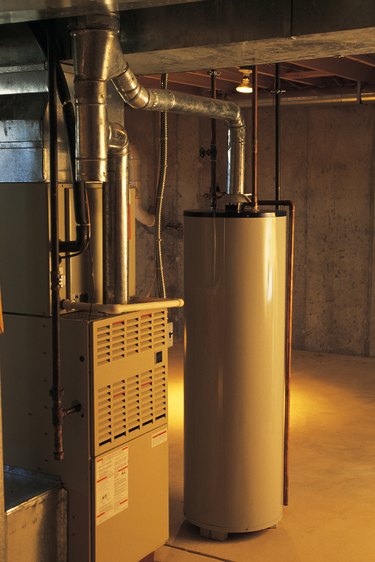
Soot is a fact of life for those of us who operate a gas- or oil-burning boiler. A little bit of soot is normal, but excessive soot production could indicate a problem with the way your boiler is operating. Large amounts of soot inhibit heat transfer, which forces your boiler to work harder than it needs to and can potentially drive up your energy costs.
Causes of Soot Buildup
Video of the Day
Soot is the inevitable result of burning fossil fuels, and boilers that run on gas or oil produce soot simply by doing their job. However, excessive soot buildup can indicate that your furnace is not running at peak efficiency. Large amounts of soot can be caused by a dirty, clogged or malfunctioning burner, inadequate draft or a low air-to-fuel ratio. Using low-grade fuel oil boilers also produces more soot than high-quality fuel.
Video of the Day
Soot Prevention and Maintenance
Having your boiler, chimney and flue cleaned regularly should prevent soot from building up to levels that inhibit your boiler's operation. Manual brushing is the simplest way to clean your system if your flue pipe and chimney are easily accessible. Otherwise, special machinery is available to blow the soot out. Switching to a higher grade of fuel should lessen the amount of soot your boiler produces. If you suspect a more serious problem with your boiler, contact a service technician to inspect your system and repair it if necessary.
Soot Puffbacks
Puff-backs are a separate issue, and considerably more serious issue than regular soot buildup. They generally occur in oil boilers and furnaces, and are the result of excess unburned or partially burned fuel oil igniting, which blows a cloud of soot out of the boiler and into the room. Depending on the severity of the puff-back, this can damage your boiler and the room you keep it in, as well as cause injury to anyone in the vicinity of the boiler when it occurs.
Causes and Prevention of Puffbacks
Puff-backs occur because leftover oil leaks back into the combustion chamber at the end of the cycle, where it can explode at the beginning of the next cycle. Causes for this include a leak in the oil supply piping, a dirty spray nozzle, boiler shutdown problems and poor maintenance. Keeping your boiler clean and well-maintained is the best way to avoid puff-backs, but they can still occur. If they do, contact a technician and avoid running your boiler until the problem has been fixed.